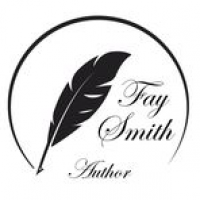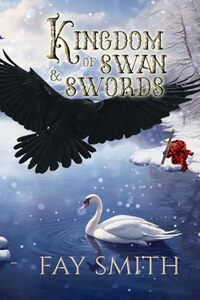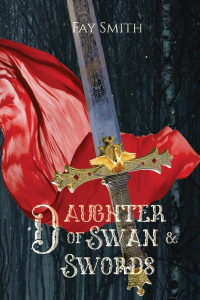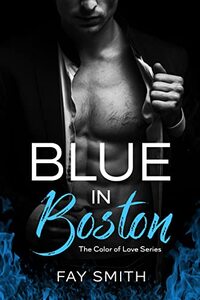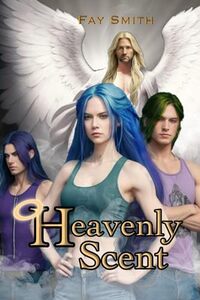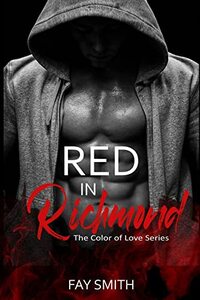Fay Smith Interview Published on: 26, Jul 2024
 What inspired you to write dark, emotionally charged novels?
What inspired you to write dark, emotionally charged novels?
I’ve always embraced my darker side, as it is the darkness within us all that pushes us to do better, to seek the light. I also love a good ‘redemption’ story. I feel like true crisis shows us who we really are, and provides the opportunity for us to be better people. My characters are relatable because they acknowledge their darkness, their shortcomings. Most people are not saints, but neither are they demons, and my writing reflects that reality.
How does your background in the military and your experiences living all over the world influence your writing?One of my books, Blue in Boston, centers around a veteran with PTSD; and I drew on my knowledge from the military to make her more realistic. I’ve always been a lover of languages, cultures, and diverse thought. I try to truly understand all of my characters from within their minds, and I believe that my exposure to other cultures and ways of thinking and expressing one’s self. There is also something about being a soldier, and having to come to terms with harsh reality, that changes how you view every day adversity. This, too, pushes me to write dark novels where lives are on the line.
Can you share a bit about your writing process? How do you delve into the psychological and emotional traumas of your characters?My novels start as a concept, usually a scene or interaction, and then the story begins to unfold for me. To be honest, it sometimes felt like stories were downloaded into my head, and I would be compelled to sit at the computer until it was all out. I draw on my own past, although my books are not autobiographical, and my study of the human condition and trauma. I also have very good friends who are psychologists, therapists, and trauma-informed whom I run ideas by.
Your novels often feature strong heroines. What draws you to writing about determined and resilient female characters?I don’t set out to write my heroines as strong; they’re flawed, and lack confidence just like any woman. However, they push through to do what is necessary, despite their shortcomings, which makes them strong. I feel this is really relatable for most women. We don’t set out to be heroes, we’re just doing the best we can. I feel that most women don’t give themselves enough credit for all of the trauma they have endured.
How do you balance portraying characters' vulnerabilities with their strengths?That’s always tricky! If I push too hard, readers will hate them. If I don’t push enough, readers will find them wishy-washy. My beta readers are key. I rely on my ARC readers for feedback and their opinion on the character development. As the author, living in a villain’s head, I may cut him slack and allow far more than the reader would; so I need ARC readers to keep me grounded and balanced.
Living in a rural area surrounded by nature, how does your environment impact your writing?I love the peace and serenity of living in a rural space. It’s much easier to get into a writing mindset without the noise and distractions of a city or suburb. This peace enables me to shift into ‘writing mode’ more easily. It feels like being on vacation.
Your novels seem to explore diverse cultures and ways of life. How do you ensure authenticity in your portrayal of these cultures?When writing about other groups or cultures I rely on research. I can’t say I always get it right, when talking about languages which have morphed or are no longer in use, but I do make every effort to be correct in my portrayals. I would never want to insult any group or culture through misrepresentation.
Are there any specific authors or books that have influenced your writing style or themes?while I wish I was as prolific as J.R.R. Tolkien, I will admit that my writing style is more heavily influenced by Sylvia Day’s Crossfire series, and just about anything by T. L. Swan. For darkness, Emily McIntire and Liv Zander are among the many authors I have read and emulate. I love dark and snarky, but witty and emotionally gripping.
Can you share any challenges you've faced as a writer, and how you've overcome them?I think I’m pretty much en par with most new indie authors facing real life commitments; I have a full-time job working for a non-profit, and I have to carve out time to write, attend conferences, market, etc. Doing all of this, while still being virtually unknown to readers, and thus not selling a lot of books, is frustrating. I know I’m far from the only one. But I love writing, and even though I sacrifice some time with my family, I can’t imagine stopping. I haven’t overcome my challenges completely, but I am working on finding the right balance of time and money to keep going.
What do you hope readers take away from your novel, “Heavenly Scent”?Heavenly Scent was the second full length novel I wrote, although I published it later. This was an impulsive write. I’m hoping that the reader takes away the idea that even if they are different, or going through extreme circumstances, there is always hope. Also, family is who you choose, not just who you’re born to.
How do you approach research for your novels, especially when dealing with topics like psychological trauma or military experiences?I try to draw on my own experiences for realism; but I also have friends who are veterans, are in the mental health fields, or both. My goal is to make the reader truly understand how the character is feeling as they process their trauma.
Do you have a favorite character that you've written, and if so, what makes them special to you?If I had to choose; Jenna, from Blue in Boston, is probably my favorite character. She represents everything I think I aspired to be (but without the trauma, lol). She’s a kick-ass martial artist, independent, and fierce. Her downside is that she’s closed-off, aloof, and sees herself as ‘damaged.’ Honestly, I think a lot of women can relate to her protecting her heart because she’s been hurt before. I love that she can be so fractured, and still be able to pull herself together with the help of the few people she does trust. Most of all, I wanted to see her get her happy ending with someone who was worthy of her.
How do you navigate the balance between darkness and hope in your storytelling?That’s another fine line. There has to be enough drama and darkness to engage the reader to invest, but there also has to be enough hope that there can be a positive outcome, or the reader won’t continue. I find a lot of back-and-forth in my writing (one character is ready, when another isn’t, and then they swap roles). In this way the tension is maintained without the monotony of ‘good cop, bad cop.’
What projects are you currently working on, and what can readers expect from you in the future?I am working on the last book in the Color of Love series, Amber in Atlanta. However, I have a Science Fiction novel on the back burner that my editor is dying for me to finish. And of course, having just released the second book in my Swan & Swords series, I am already getting ideas for a prequel which would highlight the two MMC’s relationship development.
What has your AllAuthor experience been like so far? What are some highlights?I have enjoyed the sense of community on AllAuthor! I have found so many new authors to follow, and I look forward to finding more!
Share Fay Smith's interview
Fay Smith is an author renowned for her dark, emotionally charged novels. Her writing delves deeply into the psychological and emotional traumas that shape her characters, exploring their journeys with raw intensity. She currently resides in a picturesque, wooded area of the Northeast USA with her husband, three dogs, and a cat, surrounded by the natural beauty of mountains and rivers.
